Martin Luther King Jr.'s 1962 visit to University of Michigan
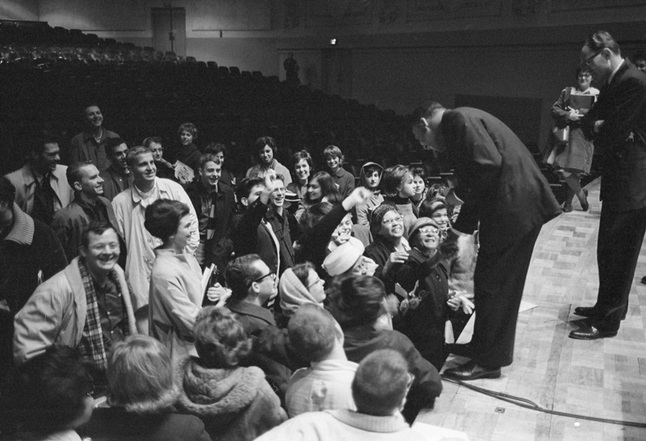
Martin Luther King Jr. speaks with students after a Nov. 5, 1962 speech at University of Michigan's Hill Auditorium.
University of Michigan Bentley Historical Library.
About 50 years ago, on Nov. 5, 1962, the man himself stood on that stage and also championed civil rights.
The visit, which was forgotten for a number of years, was rediscovered in spring 2012 when a librarian found photographs of King giving a talk at Hill Auditorium. The negatives were a part of U-M Bentley Historical Library's News and Information Services collection.
"We had stumbled across those years ago and had kind of forgotten about them," said Karen Lee Jania, an archivist at Bentley. "They had been in a box and people just kind of forgot about it."
As U-M celebrates the 50th anniversary year of King's 'I Have a Dream' speech, AnnArbor.com is highlighting five photos of King's visit to Ann Arbor, which occurred about 10 months before King's historic speech.
All photos are courtesy of U-M's Bentley Historical Library.
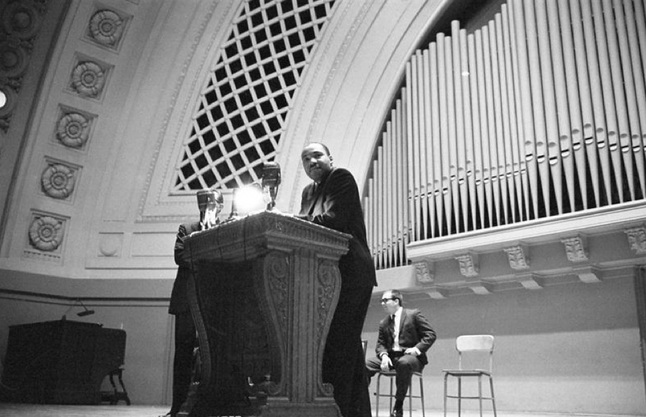
University of Michigan Bentley Historical Library
Records indicate that King gave two talks during his brief visit to the university. In a 2012 Michigan Daily article, former U-M President James Duderstadt said King's visit sparked controversy at U-M.
“There apparently was a controversy because in his speech, King suggested the importance of civil disobedience, and I guess a couple of the (university) regents raised concerns about that,” Duderstadt told the Daily. “It was almost exactly 50 years ago, and it was a time when Martin Luther King was a pretty controversial person. The FBI was tracking him and so forth.”
Later, in the late-1960s, the Board of Regents would pass a resolution memorializing King, who was assassinated in April 1968.
"The university was stunned by the death of Dr. King," read regents' meeting minutes from April 1968. During that meeting the regents set up a Martin Luther King Jr. Scholarship Fund.
Around the time of King's assassination, it appears a group of students used force to "close a building," which Robben Wright Fleming, university president at the time, called "intolerable," according to the 1968 meeting minutes.
"However, on a day near that of the assassination of [King], emotions ran deeply. Seen in the contact of events and given the horror of the assassination of Dr. King, one could tolerate interference in that situation," the minutes state. "Further, [Fleming] said the regents did not condone the action, but viewed it differently in light of the given movement."
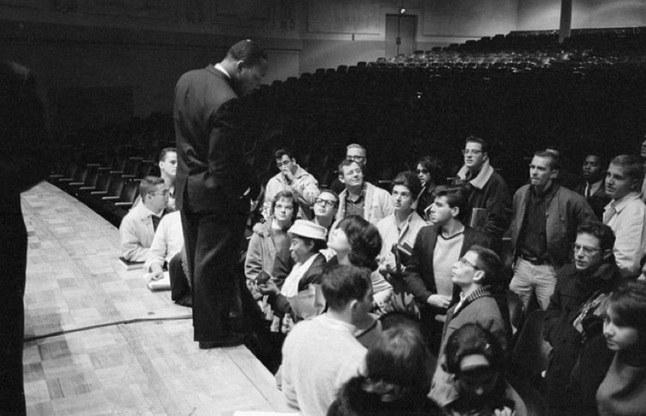
University of Michigan Bentley Historical Library
In this image, King speaks with students after his Nov. 5 speech.
Just months before, in July, King had been arrested and jailed after a protest in Albany, Georgia.
“It wasn’t a big crowd, it appears to be somewhat small,” said Jania. “I don’t think it was of campus-wide interest at the time… it’s conceivable that it was maybe a last minute kind of thing, so publicity didn’t get out.”
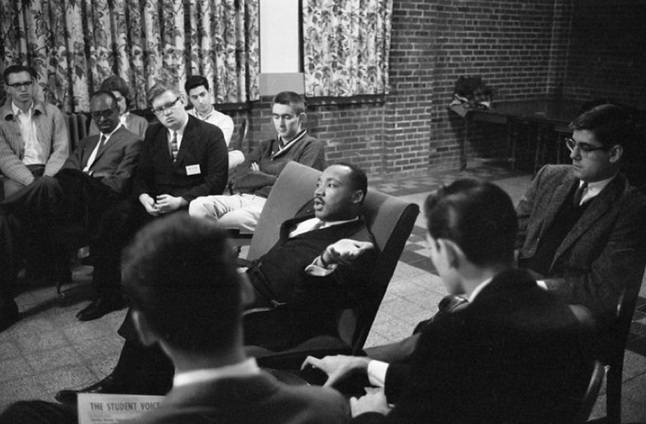
University of Michigan Bentley Historical Library
In this image, King is pictured during a discussion in an undetermined campus location.
Three years later, in 1965, King would visit Michigan State University's campus in East Lansing. According to archives, more than 4,000 students attended that lecture.
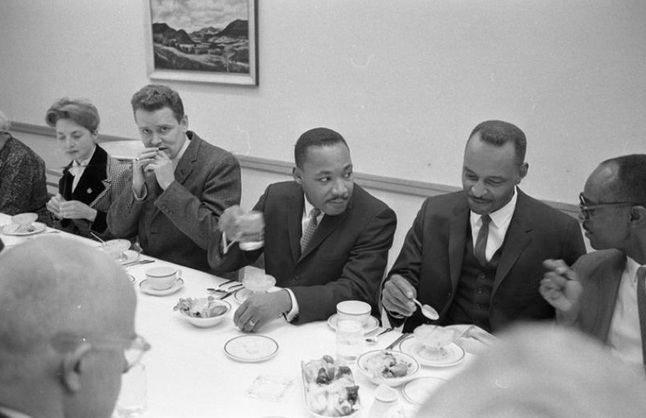
University of Michigan Bentley Historical Library
King pictured here at U-M.
Jania said there was little press coverage of King's visit and details about his lecture are sparse.
"It's not very well documented," she said.
Kellie Woodhouse covers higher education for AnnArbor.com. Reach her at kelliewoodhouse@annarbor.com or 734-623-4602 and follow her on twitter.


Comments
billhunt
Sat, Aug 24, 2013 : 8:59 p.m.
I heard him speak in November 1962 and again in August 1963 in Washington. The pictures in this article don't show the overflow crowd at Hill Auditorium that November night. The campus was alive and electrified. Civil rights was very important. It was an absolutely exciting time to be on the UM and many other campuses around the world. I was also in Memphis during the morning of the day he was shot. I was very much aware he was in Memphis to help the striking garbage workers. I was stunned. Hoover thought he won, but he didn't. The civil right movement King and many others fought for over many years has survived and changed the US for the better. Hoover has been relegated to the dark bowels of US history. Sadly, his invasive and obtrusive spirit lives on in the FBI, CIA, and NSA. Hoover was a myopic little man who obsessed about power, regardless of what it cost his country.
KateT
Sun, Jan 20, 2013 : 4:37 p.m.
David and Kai, thank you. Some day I'm going to inquire about listening to the Rosa Parks tapes.
Gorc
Sun, Jan 20, 2013 : 4:16 p.m.
Can you imagine the feeling and emotions of the librarian who rediscovered these five photos. You open a box or envelope, you pull the pictures out, and you gaze at historical images of an American icon that have not been seen in decades. I am awestruck (and jealous) just thinking about the experience he or she went through that day.
Gorc
Sun, Jan 20, 2013 : 9:53 p.m.
David - thank you for the link.
David
Sun, Jan 20, 2013 : 4:57 p.m.
http://www.michigandaily.com/news/photos-martin-luther-king-jr-university-visit-discovered
Wolf's Bane
Sun, Jan 20, 2013 : 3:57 p.m.
Who is Dr. King?
KateT
Sun, Jan 20, 2013 : 4:54 a.m.
If memory serves, Rosa Parks visited U of M in the 1980's. There was only a small gathering of students, maybe 20 at most. The location was perhaps a cafeteria in one of the Hill dorms. Does anybody remember this? Is there some way to look this up?
Kai Petainen
Sun, Jan 20, 2013 : 2:29 p.m.
here's a tinyurl that might help with the link http://tinyurl.com/b7gntvu
David
Sun, Jan 20, 2013 : 1:41 p.m.
See: Bentley Historical Library http://quod.lib.umich.edu/b/bhlead/umich-bhl-9618?rgn=Entire+Finding+Aid;sort=occur;subview=detail;type=simple;view=reslist;q1=Rosa+Parks Lola M. Jones videotapes Interview with Rosa Parks, December 1993
Mike
Sun, Jan 20, 2013 : 3:57 a.m.
By no rights should he be called a Dr. He plagiarized his PhD thesis. This has been demonstrated over and over. Call him Mr. That will suffice.
Roger Rayle
Sun, Jan 20, 2013 : 12:53 a.m.
MLK's visit was part of a chain of events that inspired Larry Brilliant to go on to great things...wguru.wordpress.com/2012/05/09/weather-and-mlk-helped-eradicate-smallpox/
James Toy
Sat, Jan 19, 2013 : 10:26 p.m.
Those of us who went to Hill Auditorium in 1962 to hear Dr. King speak walked in unimpeded. When Huey Newton of the Black Panther Party spoke at Hill we who attended were all patted down by Mr. Newton's guards, two at each of the four inner doors leading directly into the auditorium. I wonder if local newspapers covered Mr. Newton's visit to Ann Arbor. I was fortunate to march behind Dr. King in the Detroit Civil Rights March of June 1963, and to hear his subsequent address, nearly equivalent to the one he was to give at the Lincoln Memorial two months later.
Frustrated in A2
Sat, Jan 19, 2013 : 11:29 p.m.
That's awesome that you were able to witness such a great figure in U.S. history.
David
Sat, Jan 19, 2013 : 10:43 p.m.
See: Bentley Historical Library resource on Michigan Daily coverage on Huey Newton http://quod.lib.umich.edu/b/bhlead/umich-bhl-93828?byte=117409170;focusrgn=C03;rgn=Entire+Finding+Aid;sort=occur;type=simple;view=text;q1=Huey+Newton Box 2: Crowds in Hill for Huey (Newton?), 11/17/70 (Gainer)
shepard145
Sat, Jan 19, 2013 : 10:13 p.m.
Would be enlightening to see a reporter ask some of these professing lovers of MLK some questions about his movement, speeches and intent and see how many have a clue. Certainly much of what MLK stood for is contrary to socialist "gimme more" left of today, regardless of color.
Ivor Ivorsen
Sun, Jan 20, 2013 : 1:19 a.m.
"The profit motive, when it is the sole basis of an economic system, encourages a cutthroat competition and selfish ambition that inspires men to be more concerned about making a living than making a life"-- MLK Does this fit the bill?
anti-thug
Sat, Jan 19, 2013 : 9:27 p.m.
i dont here this propaganda that king was some how "controversial" or "dangers" the only reason FBI was following was because he wanted change the laws. "There apparently was a controversy because in his speech, King suggested the importance of civil disobedience, and I guess a couple of the (university) regents raised concerns about that," Duderstadt told the Daily. "It was almost exactly 50 years ago, and it was a time when Martin Luther King was a pretty controversial person. The FBI was tracking him and so forth.""
Dog Guy
Sat, Jan 19, 2013 : 5:19 p.m.
Noteworthy are the photos of the Hill Auditorium throng; why was I there? I remember 1962 Ann Arbor. That was shortly after Dr. Wheeler discovered his black consciousness. That wonderful stuffed shirt Cecil Creal was mayor. Potholes were then a sign of Spring. Ah, the good old days!
David
Sat, Jan 19, 2013 : 5:03 p.m.
If you notice on the first picture--there is a not-so-conspicuous man standing next to the exit who seems to be taking notes. Hmmm....
a2citizen
Sun, Jan 20, 2013 : 7:43 p.m.
He's texting on his iPod.
genetracy
Sat, Jan 19, 2013 : 3:35 p.m.
In 1962, Dr King left the south to come to the "progressive north" to deliver a speech about race relations and civil disobedience. The 1962 Ann Arbor I remember was racially segregated and the only blacks you saw on campus were athletes.
Jack Baker
Sun, Jan 20, 2013 : 6:01 p.m.
I believe the reality is somewhere in between the various replies in this post. My family lived on Ann Arbor's Northside, and my five siblings and I all attended Northside school beginning in 1960. The Northside was an integrated neighborhood, black and white families living adjacent, but Ann Arbor struggled at that time as did the rest of the country with civil rights. My father was the PTO President at Northside, when Dr. Harry Mial, the first black principal in the AAPS, was installed at Northside following winning a discrimination lawsuit Dr. Mial filed after being passed over for other principal assignments. There was notable "AA community" resistance to his assignment, and my father was involved in supporting Dr. Mial in his role. I grew up expecting most communities were integrated like Ann Arbor's Northside, and it was only later I realized I had been so fortunate to be raised here, and specifically in the Northside neighborhood.
a2 Brute?
Sun, Jan 20, 2013 : 1:26 a.m.
gene, how come your family did not live on the north side?
anti-thug
Sun, Jan 20, 2013 : 12:20 a.m.
Ann Arobr is still as little segregated today.
a2citizen
Sat, Jan 19, 2013 : 10:09 p.m.
"...the only blacks you saw on campus were athletes..." Really? And what sport(s) did they play?
genetracy
Sat, Jan 19, 2013 : 4:40 p.m.
Dr Bryant was a highly educated professional. The black working and middle class were segregated on the north side of Ann Arbor. My family lived in East Ann Arbor and there was not a black family for miles.
Michigan Man
Sat, Jan 19, 2013 : 4:11 p.m.
Gene - Totally incorrect selective memory. I, likewise, lived in Ann Arbor in 1962. Dr. Bryant a pathologist at St. Joe was a fine example of a number of black who were viewed as community leaders back in the day. I could go on and on with names of many leading black Ann Arborites but it would only completely refute you foolish comments so I will stop.
Kai Petainen
Sat, Jan 19, 2013 : 3:32 p.m.
amazing photos btw... what a great treasure to find...
Kai Petainen
Sat, Jan 19, 2013 : 3:31 p.m.
hindsight is 20-20.... "Jania said there was little press coverage of King's visit " Do we know why? Was it for political reasons? Because of the regents? "guess a couple of the (university) regents raised concerns"
Jeffersonian Liberal
Sat, Jan 19, 2013 : 2:38 p.m.
It is truly a shame that the progressives wont take the time Monday to listen to Dr. Kings words. Instead they will continue to use the Government to punish people that don't believe their twisted philosophies. They will selectively discriminate to correct some perceived short comings in society while enslaving my black brothers on the Democrat plantation. Rise up, throw off the chains and free your minds!
Elijah Shalis
Sat, Jan 19, 2013 : 5:38 p.m.
Hmmmm You know Jefferson owned slaves and had sex with them right?
YpsiGirl4Ever
Sat, Jan 19, 2013 : 5:35 p.m.
What? What an "race card" pull from the deck comment, not worthy to be on this beautifully written and pictorial article or A2.com.
Michigan Man
Sat, Jan 19, 2013 : 1:27 p.m.
Very fine pictures. Any idea who the other people are with Dr. KIng? I presume the black men and women are leaders from the Ann Arbor black community, back in the day?